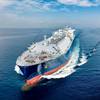Marine Lubricant Choice 'More Critical than Ever'
The technological evolution of new marine fuels and engines places increased demands on cylinder oils, says lubricants supplier Castrol.
More efficient engines, new and varied fuels, and recent changes to leading OEM cylinder oil strategies are making lubricant choice a more important and complex decision.
Castrol’s survey of marine owners, operators and managers, earlier this year, revealed that 30% of those surveyed had undertaken no or limited planning to prepare for new fuels.
When the dynamic between engine, fuel and lubricant isn’t right it could result in reduced efficiency, dirtier engines, and damage to cylinders, while increasing costs.
The changes mean owners and operators should consult closely with lubricant providers to find solutions for engines that have a good balance of both cleaning and neutralizing power, Castrol says.
Cassandra Higham, marketing director, Global Marine & Energy, Castrol, says, “The sulphur cap means we have entered a new era of complexity in the engine room. In addition, the journey to decarbonization will mean an increasingly diverse fuel mix, where lubricant choice becomes more critical.
“Increasing stress on engines, a focus on cost, and more blended fuels mean that previous assumptions in the choice of lubricants no longer apply. Castrol supports a new, collaborative approach, with an emphasis on engine cleanliness, in this more challenging operating environment.”
For years, the measure of performance of a cylinder oil has been largely based on its alkalinity, or base number (BN). However, with lower sulphur levels in fuels, cylinder oils need to have both cleaning and neutralizing power to protect engine hardware. Castrol Cyltech 40SX was formulated with a bespoke detergency system specifically for use with low sulphur fuels.
Higham adds, “It is vital that lubricant providers, engine manufacturers, ship owners, fuel suppliers and technical staff come together to smooth the road for shipping. The current challenges are only the tip of the iceberg, as the shipping industry aims to transition to new lower carbon fuels and energy.”
Castrol says it is working with the whole sector to help change the way the market views marine lubricants. Part of this includes a program of consultative operational and technical improvements that can ultimately drive efficiencies across the engine room – an initiative called ‘SmartGains’.
Higham concludes, “As the industry works to stabilize, we’re encouraging the conversations.”











